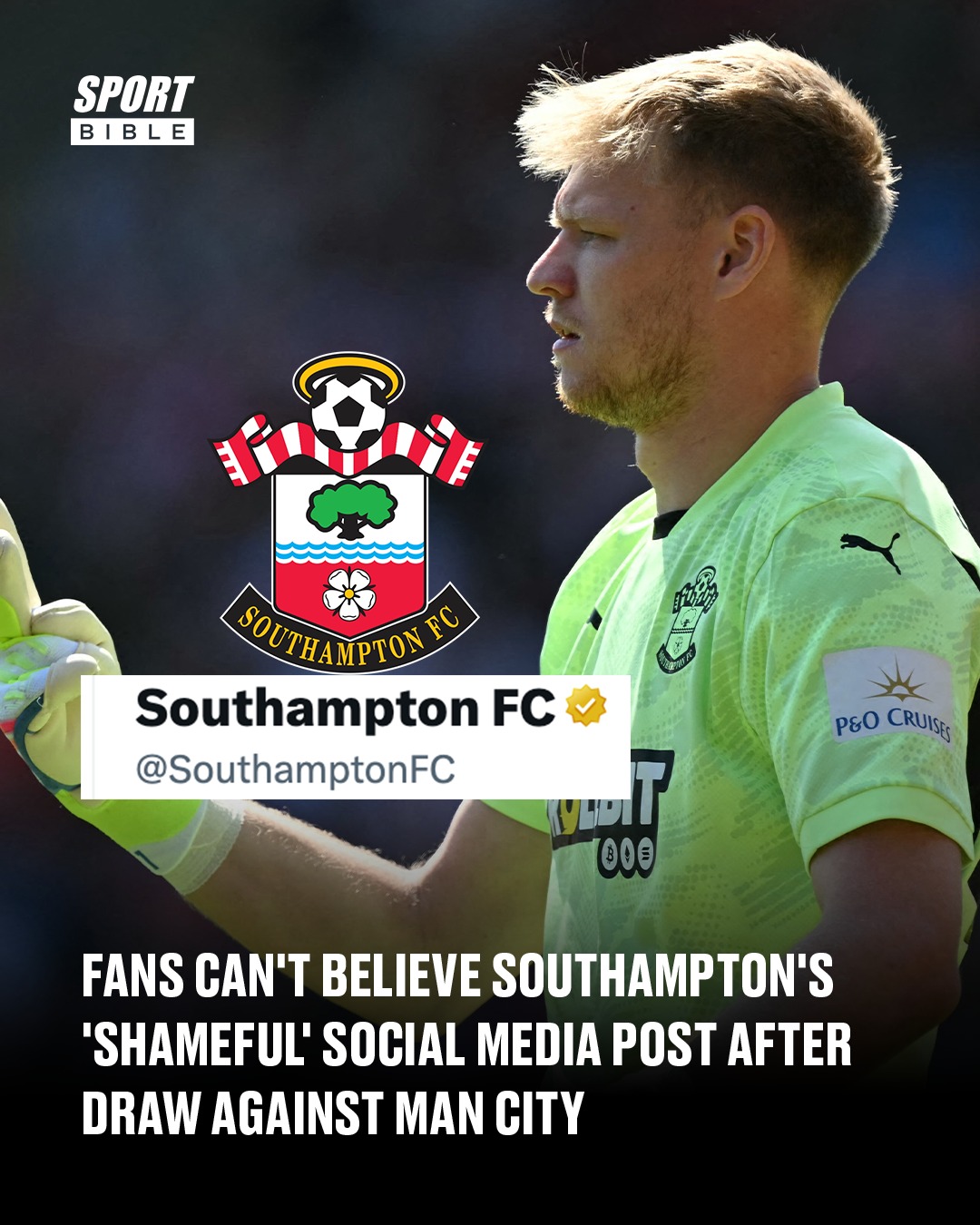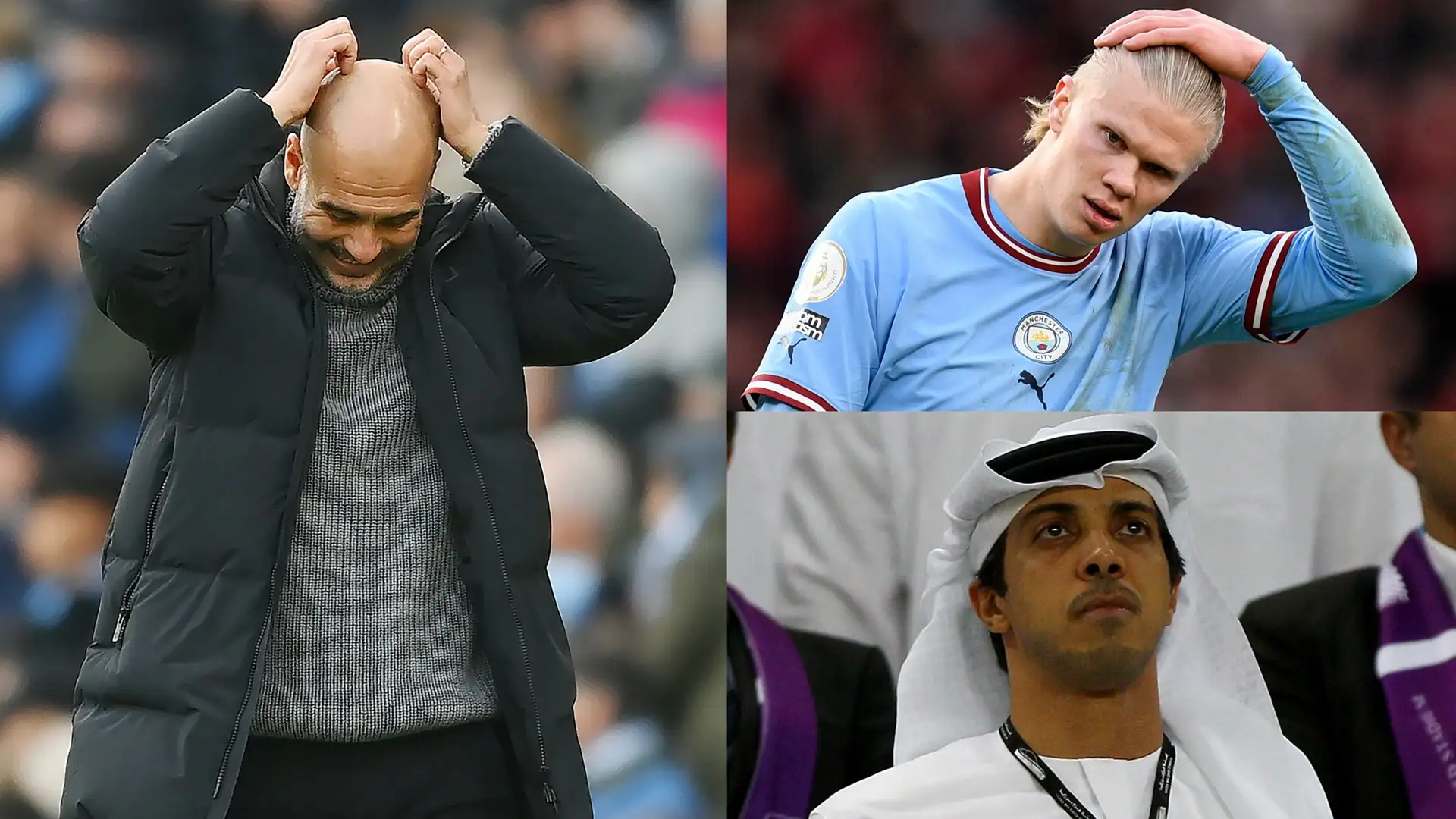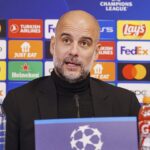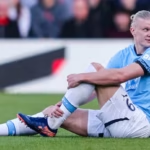Southampton’s “Shameful” Social Media Taunt After Manchester City Draw

Southampton Football Club found themselves at the center of a social media controversy following their unexpected goalless draw against title-contending Manchester City at St. Mary’s Stadium. The 0-0 result on Saturday marked a rare positive moment in what has been a disastrous campaign for the Saints, who had already suffered the ignominy of relegation from the Premier League weeks earlier.
The south coast club’s social media team, seemingly eager to celebrate their achievement of securing just their third clean sheet of the entire season, posted a message on their official X (formerly Twitter) account that read: “Sorry if we got your hopes up, @dcfcofficial.” This pointed reference to Derby County FC was immediately recognized by football fans as an acknowledgment that Southampton had narrowly avoided breaking Derby’s infamous record for the lowest points total (11) in Premier League history.
With this single point against Manchester City, Southampton moved to a marginally less embarrassing 12 points for the season, ensuring they would finish as merely the second-worst Premier League side in history rather than the absolute worst. While this might have seemed worthy of celebration to someone within the club’s communications department, the post’s tone and timing struck many observers as remarkably tone-deaf.
Fan reaction was swift and overwhelmingly negative. “What happened to shame?” questioned one social media user, articulating the bewilderment many felt at seeing a historically successful club like Southampton appearing to celebrate what remains, by any reasonable measure, a catastrophically poor season. Another fan responded with even greater incredulity: “Wait a minute, are you bragging about being the second worst premier league side ever? F***ing tinpot club man.”
The backlash highlighted a fascinating aspect of modern football culture—the tension between self-deprecating humor and maintaining professional dignity. While many clubs have embraced a more casual, engaging tone on social media to connect with younger fans, Southampton’s post seemed to cross an unwritten line by celebrating what most supporters would consider an abject failure.
“Even for bait this is proper tragic, head would be on Mars if I was a Saints fan,” wrote another commenter, using the term “bait” to suggest the post was deliberately provocative to generate engagement—a common social media strategy that many find increasingly tiresome when employed by official club accounts.
What makes the controversy particularly interesting is how it contrasts with the measured, professional tone struck by Southampton’s interim manager Simon Rusk in his post-match comments. While the club’s social media team was drafting their controversial tweet, Rusk was speaking to reporters about the positive aspects of the performance: “Going into the game, we wanted to make it clear that we wanted to finish the season as strong as possible with lots of pride. We delivered that really well.”
Rusk continued with a more forward-looking perspective that many fans likely would have preferred to see reflected in the club’s official communications: “The players stood up and it took a lot of courage to deliver that performance. It is important to build momentum for next season.”
For Manchester City, the draw represented a significant setback in their own campaign. Pep Guardiola’s men missed an opportunity to strengthen their position in the Premier League’s top five, remaining within striking distance of the chasing pack with just five points separating them from Aston Villa in seventh place.
Guardiola himself appeared frustrated by Southampton’s defensive approach, telling Sky Sports: “The second half was much better but they defended so deep. I didn’t expect it. We had four or five chances and unfortunately we could not score… There were 11 players in the 18-yard box, it is difficult.”
This tactical context adds another layer to the social media controversy. While Southampton’s post celebrated avoiding Derby’s record, it failed to acknowledge the genuine achievement of their players in frustrating one of the world’s most expensively assembled and tactically sophisticated teams. Instead of highlighting the resilience and determination shown on the pitch, the club opted for a post that seemed to revel in the minimal achievement of not being statistically the worst team in Premier League history.
The incident serves as a compelling case study in sports communications. In their eagerness to create engagement and perhaps find some silver lining in a dismal season, Southampton’s social media team misjudged the appropriate tone and inadvertently reinforced negative perceptions about the club’s standards and ambitions. For an organization with Southampton’s proud history—a founding member of the Premier League with a renowned youth academy that has produced stars like Gareth Bale, Theo Walcott, and Alan Shearer—the post struck many as unbecoming of an institution that had previously been synonymous with punching above its weight in English football.
The controversy also raises questions about the increasing pressure on social media teams to generate engagement at all costs. In an environment where success is often measured in likes, shares, and comments, the temptation to post provocative content can sometimes override considerations of how such content reflects on the organization’s values and reputation. Southampton’s post certainly achieved high engagement—19,800 responses according to the metrics shown—but much of this interaction came in the form of criticism and mockery.
As Southampton prepare for life in the Championship next season, rebuilding both their on-field fortunes and their relationship with supporters, this social media misstep serves as a reminder that how a club communicates during difficult times can be almost as important as results on the pitch when it comes to maintaining fan loyalty and institutional respect.
Alex Pereira Clarifies “Hacked” Social Media Post About Quitting UFC
UFC light-heavyweight fighter Alex Pereira found himself needing to quickly address a concerning social media post that appeared on his official X account, seemingly threatening to walk away from the Ultimate Fighting Championship altogether. The Brazilian star, who hasn’t competed since losing his championship belt to Magomed Ankalaev by unanimous decision in March, stunned the mixed martial arts community when a post from his account suggested he was contemplating retirement due to apparent dissatisfaction with the organization.
The original post, which quickly circulated throughout the MMA world, stated: “I always answered the UFC’s calls, but if they want to play with me, we can do that. I’ve never spoken poorly of the UFC but with what I’ve just heard I’m disheartened. I’ve already had thoughts of not fighting anymore, and after what was just relayed to me this may be the start.”
For fans of the spectacular knockout artist known as ‘Poatan,’ the message came as a shock. Pereira has been one of the UFC’s most reliable and exciting champions in recent years, defending his light-heavyweight title three times in rapid succession before his recent defeat. The post hinted at behind-the-scenes tensions that had previously remained private, suggesting a significant breakdown in the relationship between the fighter and the promotion.
However, in a surprising twist, Pereira quickly released a video statement claiming that his account had been compromised and that he had no knowledge of the controversial post until he began receiving messages from concerned fans and media members.
“Well everyone… I’ve received a ton of messages… getting messages from everyone who saw a post from my Twitter,” Pereira explained in the video. “I didn’t even know about it. I was hacked. It’s been a while since I’ve posted anything. But I was hacked and I’ll resolve it.”
Pereira was emphatic in denying any deterioration in his relationship with the UFC, stating: “I don’t even know what’s going on. I have a great relationship with UFC. Chama.” The Portuguese word “Chama” at the end of his statement is often used colloquially to mean something akin to “let’s go” or “bring it on,” suggesting Pereira remains committed to his fighting career.
The incident highlights the unique vulnerabilities that high-profile athletes face in managing their digital presence. For someone like Pereira, whose meteoric rise in the UFC has made him one of the promotion’s most marketable stars, a single unauthorized social media post could potentially damage relationships with the organization, sponsors, and fans that have taken years to build.
Pereira’s journey in the UFC has been nothing short of remarkable since his debut in November 2021. After defeating Sean Strickland to earn a title shot, he achieved what many thought impossible by stopping Israel Adesanya to claim the UFC middleweight championship. Though he lost the rematch to Adesanya, Pereira’s decision to move up to the light-heavyweight division proved inspired, as he defeated Jiri Prochazka to capture the vacant title.
His subsequent title defenses against Jamahal Hill, a rematch with Prochazka, and Khalil Rountree Jr. cemented his status as one of the most active and exciting champions in recent UFC history. At 37 years old, the former GLORY kickboxing champion has defied age expectations, bringing a level of striking sophistication to MMA that has captivated audiences worldwide.
Given this context, the idea that Pereira might abruptly consider retirement over an undisclosed disagreement seemed plausible enough that many fans and media outlets initially accepted the post at face value. The UFC’s relationship with its fighters has occasionally been contentious, with compensation disputes and contract negotiations sometimes spilling into the public domain.
The incident also reflects the heightened scrutiny that fighters face when using social media to communicate directly with fans. While platforms like X, Instagram, and TikTok allow athletes to build personal brands independent of their promotions, they also create pressure to maintain a consistent digital presence. When an unexpected or controversial post appears, it immediately becomes news in the 24/7 sports media environment.
The swift manner in which Pereira addressed the situation demonstrates an understanding of how quickly misinformation can spread in the digital age. Rather than allowing speculation to build, he recorded a video explanation within hours of the original post, directly addressing his fans and UFC President Dana White.
While some skeptics might question whether the “hacking” explanation was genuine or a convenient cover for a post that the fighter later regretted, Pereira’s claim is consistent with his historically professional relationship with the UFC. Throughout his career, he has maintained a reputation as a company man who avoids public criticism of the organization, making the tone and content of the original post incongruous with his established communication style.
As Pereira looks to rebuild momentum and potentially reclaim the light-heavyweight championship, this social media incident serves as a reminder of the additional challenges that modern athletes face beyond their sporting performances. Managing digital identity has become an essential skill for competitors in high-profile sports, where a single unauthorized post can create headlines around the world.
For the UFC and other sports organizations, the incident also highlights the importance of helping athletes secure their digital accounts and providing support when security breaches occur. As social media continues to blur the lines between athletes’ professional and personal lives, the need for sophisticated approaches to digital security and crisis management becomes increasingly apparent.
Manchester United Criticized for Snubbing Former Player in Social Media Post
Manchester United found themselves facing fan criticism after their official social media account appeared to deliberately avoid mentioning former player Anthony Elanga by name following his spectacular goal against them for Nottingham Forest.
The incident occurred during a Premier League match at the City Ground, where Ruben Amorim’s Manchester United team was taking on Nuno Espirito Santo’s high-flying Nottingham Forest. Just five minutes into the contest, Swedish international Elanga—who had been developed in United’s own academy before being sold to Forest—delivered a moment of individual brilliance that silenced the traveling supporters.
Elanga’s goal was nothing short of spectacular. The winger showcased his exceptional pace and strength by running the entire length of the pitch, evading a challenge from United’s Alejandro Garnacho before calmly slotting the ball into the bottom corner of the net. It was a goal that demonstrated precisely the kind of direct attacking quality that many United supporters had hoped to see Elanga develop during his time at Old Trafford.
In the immediate aftermath of the goal, Manchester United’s official account on X posted a remarkably terse update: “Goal. The hosts take the lead.” The deliberate omission of Elanga’s name did not go unnoticed by fans, many of whom felt it reflected poorly on the club’s attitude toward its academy graduates.
“Who scored?” replied one fan pointedly, highlighting the conspicuous absence of Elanga’s name from the post. Another supporter was more direct in their criticism: “And who scores it? The one who should never been sold…” This sentiment was echoed by numerous other comments, with a third fan adding: “Who scored Admin. Mention he’s name. Shameless club, letting an academy player with talent go.”
The controversy speaks to a broader frustration among Manchester United supporters regarding the club’s player development and transfer policies in recent years. The decision to sell Elanga, who had shown flashes of promise during his time at Old Trafford, has been questioned by segments of the fanbase who believe the club has not always made the right decisions about which young talents to retain and which to sell.
This criticism has been amplified by United’s inconsistent performances and the perception that the club has spent vast sums on established stars while sometimes overlooking homegrown talent. For many supporters, seeing a former academy product excel against their team serves as a painful reminder of what might have been.
The contrast between Manchester United’s reluctance to acknowledge Elanga by name and the enthusiastic coverage from other media outlets was striking. TNT Sports, broadcasting the match, posted a clip of the goal with the caption: “ANTHONY ELANGA, THAT IS INCREDIBLE! ⚡ The winger scores a blistering solo goal against his former side 👏”
Similarly, BBC Radio 5 Live commentator Andy Reid was effusive in his praise: “That is simply incredible from Anthony Elanga. Alejandro Garnacho tried to stay with him, but Elanga shrugs him off. On his left foot, he has buried that into the bottom corner. What a goal.”
The incident raises interesting questions about how sports teams should handle situations where former players perform well against them. While the competitive disappointment is understandable, many fans believe that acknowledging the achievements of academy graduates—even when they occur in opposition colors—demonstrates class and confidence in the club’s youth development philosophy.
Manchester United has a storied history of producing talented players through its academy system. The club famously had at least one academy graduate in every matchday squad for over 4,000 consecutive games—a streak stretching back to 1937 that only ended in 2020. This tradition is central to the club’s identity, with the “Class of ’92” featuring David Beckham, Ryan Giggs, Paul Scholes, and the Neville brothers representing perhaps the most famous example of United’s youth development success.
Given this heritage, the apparent reluctance to acknowledge Elanga’s achievement struck many as petty and inconsistent with the club’s proud tradition. For a club that regularly celebrates its history of developing young talent, refusing to name a former academy player after a moment of excellence seemed at odds with Manchester United’s self-proclaimed values.
Social media managers for sports teams face complex challenges when crafting messages during live events. They must balance club loyalty and the disappointment of conceding goals with maintaining a tone that reflects the organization’s values and history. In this case, many fans felt Manchester United’s social team missed an opportunity to demonstrate grace in a difficult moment.
The controversy also highlights how social media interactions can reveal deeper tensions within sports organizations. The decision not to name Elanga may have been a simple oversight during the pressured environment of live match coverage, but fans interpreted it as symptomatic of broader institutional issues regarding youth development and transfer policy.
As Elanga continues to develop at Nottingham Forest following his summer transfer, his performances will likely be watched closely by Manchester United supporters who question whether the club made the right decision in allowing him to leave. For the player himself, moments like his goal at the City Ground offer both vindication of his abilities and motivation to prove his former employers wrong.
This incident, much like the controversies involving Southampton and Alex Pereira, demonstrates how social media has transformed sports communication. What might once have been a minor footnote in match coverage can now become a significant talking point, with fans, media, and other stakeholders scrutinizing not just what teams and athletes say, but also what they conspicuously choose not to say.
Conclusion: The Complex World of Sports Social Media
These three recent incidents—Southampton’s Derby County taunt, Alex Pereira’s alleged hacking, and Manchester United’s omission of Anthony Elanga’s name—collectively illustrate the multifaceted challenges that teams and athletes face in the social media era. From tone-deaf celebrations and security vulnerabilities to perceived pettiness toward former players, digital communications have created new pitfalls alongside unprecedented opportunities for connection with fans.
As social media continues to evolve, sports organizations must develop increasingly sophisticated approaches to digital communication that balance engagement, authenticity, security, and respect. In an environment where a single post can generate thousands of responses and shape public perception, the stakes for getting it right have never been higher.
For fans, these incidents provide fascinating glimpses into the cultures and priorities of their favorite teams and athletes. Social media has removed many of the filters that once existed between sports organizations and their supporters, creating both greater transparency and new forms of tension. As sports continue to navigate this complex digital landscape, the relationship between teams, athletes, and fans will undoubtedly continue to transform in ways that would have been unimaginable in the pre-social media era.















